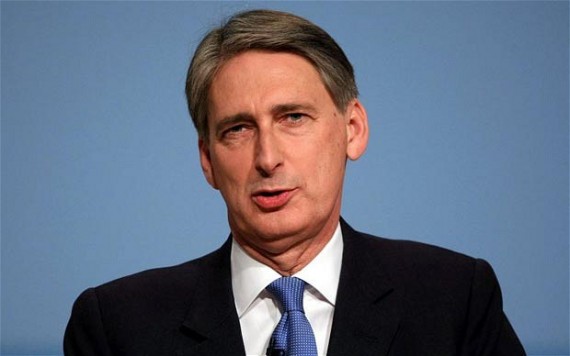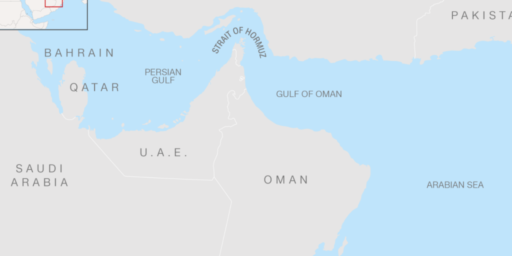UK Defense Secretary Tough on Iran, Tougher on Europe
Philip Hammond addressed the Atlantic Council this morning in advance of a meeting with Leon Panetta.
UK defense secretary Philip Hammond addressed the Atlantic Council this morning in advance of a meeting with his US counterpart, Leon Panetta. I’ve written two longish posts on his speech at the New Atlanticist blog, which I’ll highlight for you here.
UK Defense Secretary: No Preemptive Strike on Iran
While declaring “We would not be in favor of a preemptive strike on Iran,” UK defense secretary Philip Hammond vowed that any attempt to disrupt the flow of oil through Straits of Hormuz “would be illegal and unsuccessful.”
Speaking at the Atlantic Council on NATO and the Case for Collective Defense in the 21st Century, Hammond reinforced transatlantic doctrine dating back to the Carter administration when he stated, “It is in all our interests that the arteries of global trade are kept free, open and running. Disruption to the flow of oil through the Strait of Hormuz would threaten regional and global economic growth.”
So, while his government would prefer to avoid the use of force, it would do so if necessary.
He observed, “Our joint naval presence in the Arabian Gulf, something our regional partners appreciate, is key to keeping the Strait of Hormuz open for international trade” and added, “The Royal Navy will continue to play a substantial role as part of the Combined Maritime Forces, both at the headquarters in Bahrain, and through our mine counter-measure vessels which help maintain freedom of navigation in the Gulf.”
Of course, the reason Iran is threatening to close off the Strait of Hormuz is because the regime is feeling squeezed by tightening US and European sanctions in response to intransigence on its nuclear program. Asked about that in Q&A, Hammond was blunt: “My working assumption is that they are working flat out” on building a nuclear weapon.
UK Defense Secretary: Europe Failing to Meet Responsibilities
Philip Hammond blasted his fellow Europeans for “failing to meet their financial responsibilities to NATO, and so failing to maintain appropriate and proportionate capabilities.”
Hammond declared, “Without strong economies and stable public finances it is impossible to build and sustain, in the long-term, the military capability required to project power and maintain defense.” Echoing former US Joint Chiefs Chairman Mike Mullen, he added, “That is why today the debt crisis should be considered the greatest strategic threat to the future security of our nations. The fact is, in this era of austerity not even the United States can afford the astronomical resource commitment required to deal with every threat from every source.”
[…]
Yet, despite the obviousness of this fact, many allies are not following through. “Libya and Afghanistan have highlighted the significant difficulties we face in ensuring NATO continues to serve the needs of collective security,” Hammond observed. Then, echoing former US defense secretary Bob Gates, he charged, “Too many countries are failing to meet their financial responsibilities to NATO, and so failing to maintain appropriate and proportionate capabilities. Too many are opting out of operations, or contributing but a fraction of what they should be capable of.”Cutting to the chase, he pointed out, “This is a European problem, not an American one. And it is a political problem, not a military one.”
It was a very powerful speech. I offer substantial commentary in both posts, especially the latter. Highlights:
It would seem obviously in the interests of all concerned to avoid war in Iran. Despite a lot of saber rattling and talk about a nuclear Iran being “unacceptable,” the military option has been only theoretically on the table during the years of tensions over the issue.
One hopes that the Iranian regime receives Hammond’s message that this forbearance has its limits. A standoff over the Strait of Hormuz would almost certainly lead to shots being fired. Containment becomes quite difficult, indeed, once that happens.
And:
There was surely little disagreement with any of that in an Atlantic Council audience. The frustrations of NATO allies not pulling their weight, even to the point of meeting the minimum two percent of GDP spending level that all agree to as a condition of Alliance membership, are so long standing that mentioning them amounts to throat clearing.
Yes, the problem is primarily political. But it appears absolutely entrenched. Simply put, most Europeans see little real threat to their security on the horizon; meanwhile, their economies are in dire trouble and the cradle to grave government support system most have become accustomed to is in danger of collapsing.
I’m thus left in the odd position of quoting Donald Rumsfeld in successive posts—or, in this case, Rumsfeld quoting Shimon Peres: “If a problem has no solution, it may not be a problem, but a fact, not to be solved, but to be coped with over time.” The bottom line is that, whatever cathartic benefit comes from lambasting the Germans and others for not doing as much as we would like on the security front, it’s simply a fact that we are going to have to cope with over time.
More at the links.







Funny guy.
Well, tough words, yes. But since Great Britain has absolutely no military “throw” any more – they do not have even one aircraft carrier – and their strategic-deployment force is down to one brigade, this is the last guy who has credibility to be talking to Iran about not backing down.
“it’s simply a fact that we are going to have to cope with over time.”
Well, if the U.S. decides to get out of the global security business or simply can’t afford it any more, Germany is going to have to cope with an awful lot itself. The history of economic powers who rely on others for their security is not exactly a distinguished one.
Mike
Philip Hammond blasted his fellow Europeans for “failing to meet their financial responsibilities to NATO, and so failing to maintain appropriate and proportionate capabilities.”
This is true, so long as one presumes a certain overall level of NATO “defense” spending is appropriate. The ratio of spending between the US on the one hand and everyone else on the other is out of whack, yes. We’re spending far too much. 😉
“Libya and Afghanistan have highlighted the significant difficulties we face in ensuring NATO continues to serve the needs of collective security,”
That’s one way of looking at it. Another way is to say that Libya and Afghanistan have highlighted the pitfalls of mission creep & “nation building,” and the dubious reasoning behind “R2P.”
@ponce: Yes, an odd choice. The Arabian Gulf is the Red Sea.
@Donald Sensing: They do have other boats. But I take your point.
@MBunge: But that’s not gonna happen. And the Germans really don’t see themselves in any real danger from outside.
@Rob in CT: I’m sympathetic to that. But the fact of the matter is that NATO members agree to spend 2 percent of GDP on defense. Only a handful of allies actually meet that commitment.
We do not disagree wrt NATO nations failing to spend 2% of GDP on defense. It’s a fair criticism, and one I think needs to be made.
Man, I’d LOVE to spend 2% of GDP on defense…
I did not see any mention of the Israeli-Iranian question, and its potential for starting the conflagration, as well as some shots fired in the Strait of Hormuz or its vicinity. Both potential events are accumulating to some danger point downstream in the near term.
War is not in anyone’s best interest, as most all veterans will readily attest, but the rhetoric about this question is rising ever higher lately, which is a strong indicator of increased concern on all sides.
Mr.’s Hammond and Mullen would be well-served by sticking to subjects they have knowledge of. Because high finance ain’t one of them.
@James Joyner: “But that’s not gonna happen.”
Granted, it seems unlikely the U.S. will voluntarily give up hegemony in the near future…but over the next 50 years? And how likely is it that the U.S. will continue to have an economy capable of supporting our massive military? Does Germany think it’s really going to benefit if global security is maintained by an ever-sickening megapower? We’ll either start flexing our muscles to benefit ourselves or we’ll descend into this self-aggrandizing delusion that ignores our economic decline, something that never ends well.
Mike
@Ben Wolf: They’re not making a high finance argument but a readiness argument. That is, they quite rightly fear that the economic downturn will mean much less money for defense. And, even at absurdly high US spending levels, big cuts mean being forced to make choices about which risks to accept. And there’s a nonzero chance of guessing wrong.
Fortunately, most military equipment and personnel can counter more than one type of threat.
@James Joyner: There is no deficit threat to national security. By stating this they show a fundamental misunderstanding of the fact that U.S. and British debt isn’t really debt at all because there is literally no one to pay back. Military budget cuts made because of debt fears will happen only because of the very ignorance on display in their comments, an ignorance of the operational realities of high finance and its relationship to spending.
Every time they make this error they reinforce the very thinking which threatens their budgets.
@Ben Wolf: Neither the shortfall in revenues nor the debt incurred are fictional in any meaningful sense. Governments take in radically less money during bad economic times and, at least in our case, make up the shortfall by massive borrowing.
Granted, countries like the US and UK borrow in their own currency and could fiat the debt away. But doing so would have enormous consequences and is therefore avoided.
@James Joyner: When you go to your bank and direct it to buy U.S. bonds for you, it debits your account and keeps the money. It then disburses bank reserves to the government’s account at the Fed to acquire the bonds. When the bond matures the reserves are then switched back to your bank’s account at the Fed and your bank returns your money to you. The Fed is the monopoly supplier of bank reserves. Do you see where this is going? There is literally no one to pay back because the government is simulating borrowing. It receives no money whatsover from the buyer of the bonds because when it spends it simply credits accounts and has been doing so for forty years.
When you put money in a savings account you are buying a piece of a bond owned by your bank. Have you ever had to wait for the government to pay those bonds off to get your money out? I’d suggest seriously thinking about that question because it has broad implications.
@ James Joyner:
Cullen Roche has a post today touching on this subject; a good one, as always.
http://pragcap.com/the-burden-we-leave-our-grandchildren
@Ben Wolf: His understanding of the mechanics is more sophisticated than mine but we end in the same place, which is that we’re constrained by our debt to the extent that we don’t want to ruin our standard of living.
Matt Yglesias likes to talk about Obama having a $50 trillion coin minted and using it to pay off the debt. We could do it! The downside, however, would be that the “full faith and credit of the United States” wouldn’t be worth much.
@James Joyner: We already print money to pay the bills, that’s what I’m trying to make understood. The U.S. has printed every dollar it has spent since 1971 simply by crediting accounts, meaning there is no actual debt and no one to pay back. We print money when we spend and unprint it when we tax, so for Mr. Mullen and Hammond to state that deficits are a serious concern in regards to national security is empirically false.